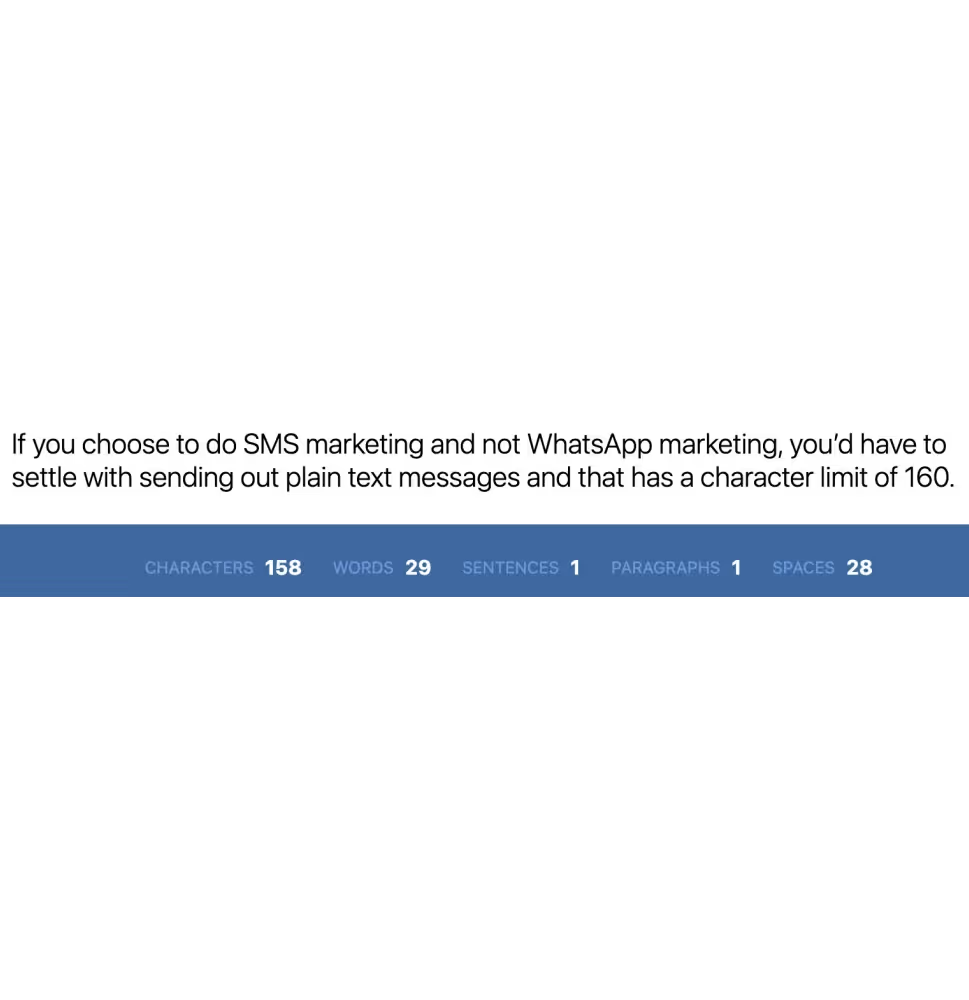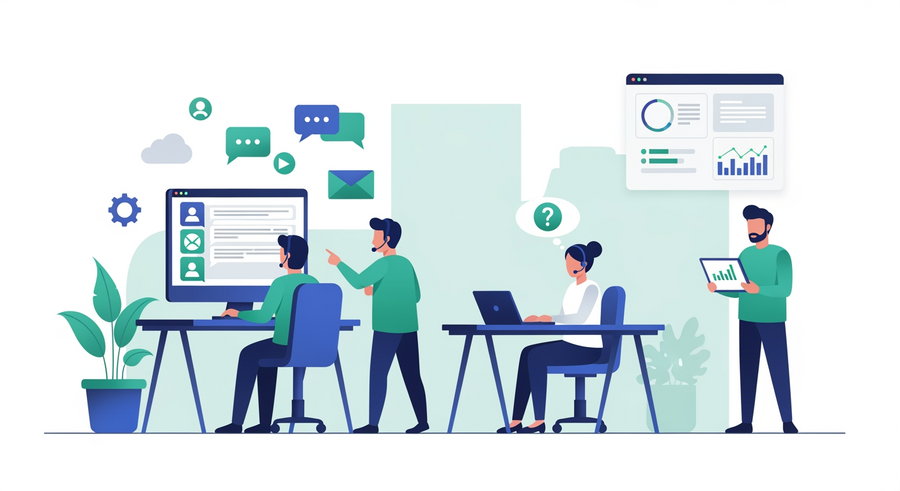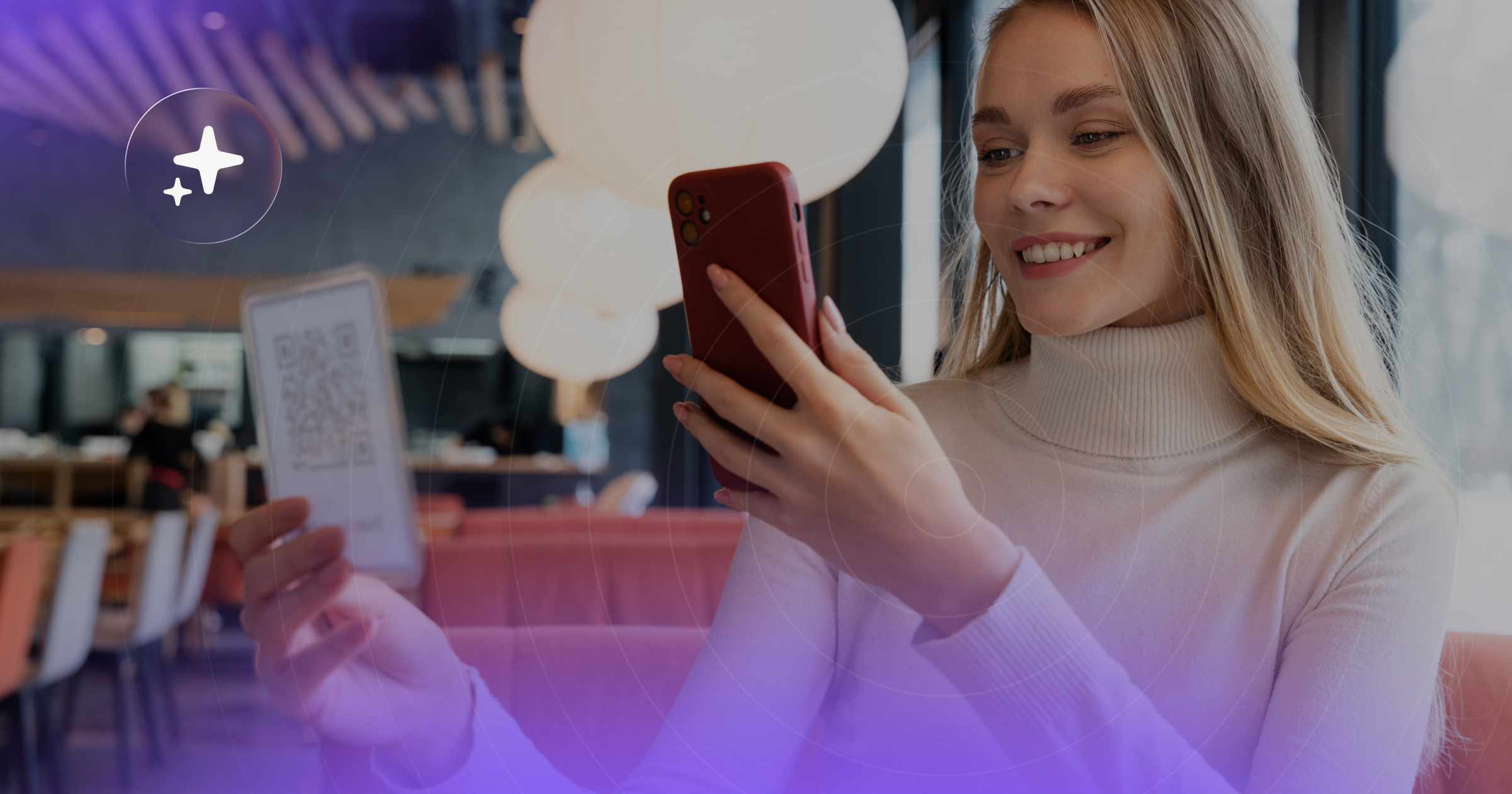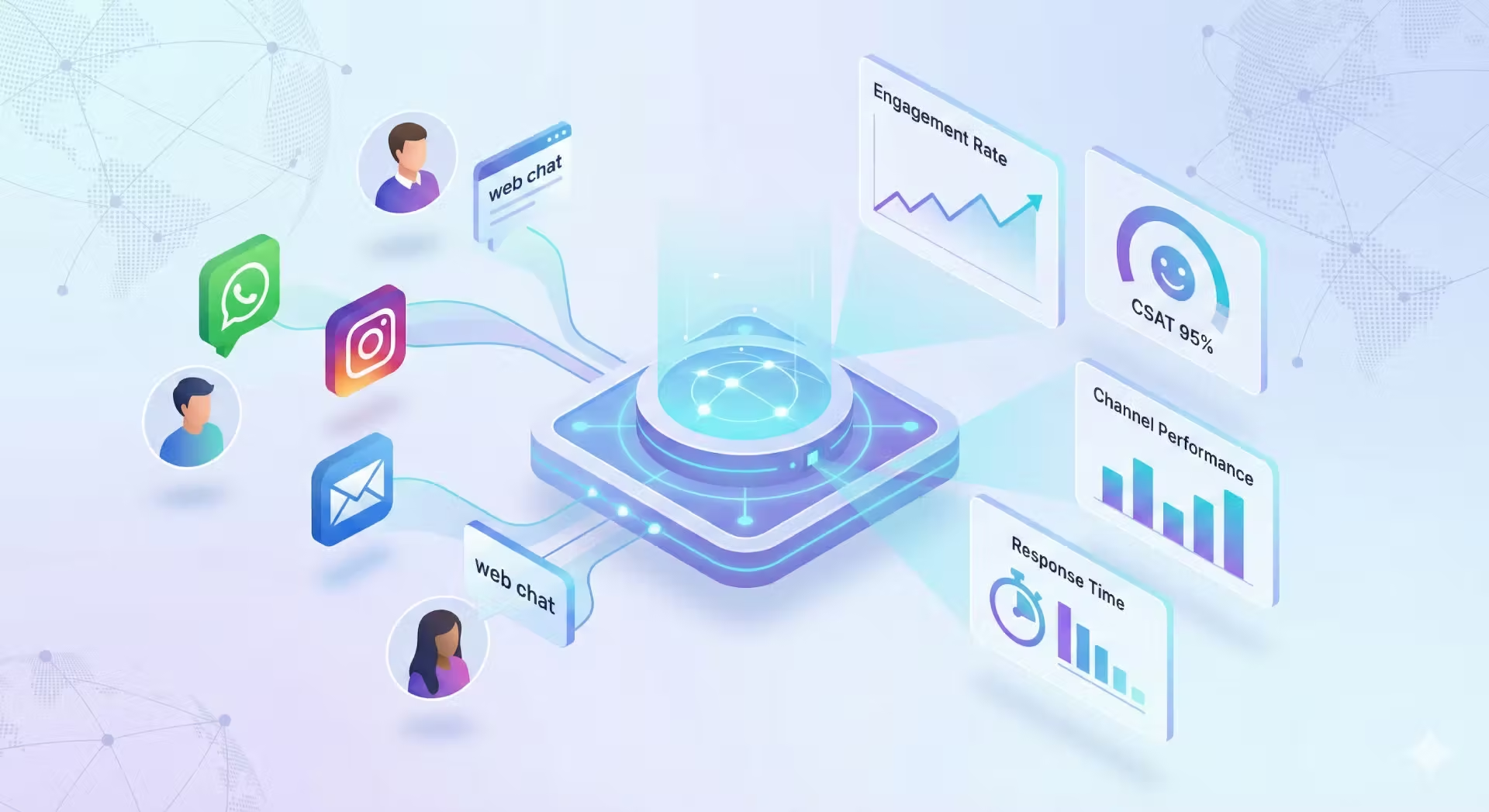Did you know that people spend approximately 3 hours and 15 minutes of their time on smartphones daily? And 1 in 5 smartphone users spends upwards of 4.5 hours on average on their phones every day.
Looking at the above statistics, it’s pretty clear that smartphones are a vital part of people’s life. So why not leverage it to market your product, right?
Well, some businesses do use SMS or WhatsApp marketing. But the majority of businesses out there have no idea about how to get started or are confused between the two.
In this SMS vs WhatsApp marketing article, you will discover the basics of SMS and WhatsApp marketing, which one’s better for your business, and which of these two techniques is best suited for specific marketing use cases.
What is WhatsApp marketing?
WhatsApp marketing is a form of messenger marketing wherein brands try to promote or sell products and build relationships with customers through WhatsApp.
It encompasses various marketing and promotional activities carried out using WhatsApp Business or WhatsApp Business API. These platforms enable businesses to initiate and manage conversations with their customers.
There are three major ways how businesses leverage WhatsApp for marketing:
#1. Promotion and offers
If you plan to launch a new product and have a user base already, WhatsApp could be a good way to market it. You can cross-sell your newly launched product to existing customers.
But remember → Ask permission from every customer to send them a promotional message.
#2. Order Tracking
If you're an e-commerce business owner, use WhatsApp to send out an order update message to your customer. The message can contain details such as ETA, shipping date, product information, and so on.

#3. Getting Feedback
Many businesses use WhatsApp to get feedback about the products or services they provide to their customers. This technique is best suited for hotels and restaurants as they can ask for a review/feedback about the service they provide.
WhatsApp marketing numbers
Numbers speak louder than words. So let's get into some numbers.
WhatsApp is available in 180 countries and 69% of the people using the internet use WhatsApp (excluding China).
Around 50 million businesses use WhatsApp Business as a medium of marketing their products and services, and this number is increasing year over year.
Here are some significant statistics about WhatsApp marketing:
- WhatsApp Business has helped businesses streamline customer service by 225%
- The WhatsApp Business API has an open rate of 99% (one percent more than SMS marketing)
- Over 40 million people worldwide use WhatsApp's business catalogue feature to find a product or service monthly
- About 175 million people use WhatsApp to contact a business daily
Benefits of WhatsApp marketing over SMS marketing
- Rich media support: Apart from your promotional message, you can also share images, videos, and documents with your customers, which makes the platform more engaging and informative compared to SMS marketing.
- Message delivery indication: When you send a message to your customers via WhatsApp, you can see whether or not the message has been delivered and read.
- Business-friendly features: With WhatsApp Business, you can create a business profile, automate messages, enable quick replies, and label customers if needed.
- Backup and security: Backup all your chats automatically daily, weekly, or monthly (you can choose). What’s more, the platform has end-to-end encryption, making your consumer data safe and secure.
What is SMS Marketing?
SMS marketing is the practice of sending targeted and personalized messages for marketing purposes using text messages.
Although SMS was invented to keep in touch with friends and family, businesses leverage it to send time-sensitive alerts, updates, and offers.
Generally speaking, businesses use SMS to send two major types of marketing messages:
#1. Promotional
Promotional messages are SMS messages that promote a new product launch, discounts, or a new sale going live.
#2. Transactional
E-commerce brands mostly use transactional messages to update customers about their ordered products. The customers get to know about the shipping status of the product and the delivery date and time.
Here’s how it looks:

SMS marketing numbers
In 2021, Attentive surveyed 2,000 people to learn about SMS marketing in detail. 66.5% of the people said they’ve signed up for some or the other brand’s SMS opt-in.

Here are some other interesting statistics about SMS marketing that will blow your mind:
The average open rate is why so many businesses choose to go down the route of SMS marketing. In 2022, the average open rate of SMS was 98%.
- 45% of people who receive branded text messages reply to it (SlickText)
- Businesses that use SMS marketing state that it accounts for 12.8% of their online revenue
- 20% of customers receiving SMS said they bought a product after receiving a message from a small business
- The average click-through rate of SMS marketing is 19%
💡Pro Tip → Did you know that 61% of marketers still don’t use SMS as a marketing medium? So be in the 39% who use it and get an edge over your competitors.
Benefits of SMS marketing over WhatsApp marketing
- Wider reach: There are ~6.8 billion active smartphones in the world, and SMS is a feature on every smartphone ever made. So you have ~6.8 billion potential buyers to pitch your product or service to.
- High open rates: As mentioned earlier, SMS marketing has an open rate of 98%.
- Simpler and more direct: You don't need to build conversations when doing SMS marketing; rather, be to the point, keep it short, and promote your product directly.
- Less competitive: Only 40 out of 100 businesses rely on SMS marketing, so the marketing technique is less competitive and can help you grab a large chunk of the market share if done right.
SMS vs WhatsApp Marketing
Although both types of marketing are used for the same purpose, more or less, there are several differences between them.
1. Accessibility
SMS marketing works on the cellular network, whereas WhatsApp marketing needs the internet to send and receive messages. This means it's easier to access SMS rather than a WhatsApp message.
To do WhatsApp marketing, you'd need to download the WhatsApp Business app from the Play Store. But for SMS marketing, you don't need to install any kind of app.
All-in-all, we’d say, when it comes to accessibility, SMS marketing is better than WhatsApp marketing.
2. Messaging format and length
If you choose to do SMS marketing over WhatsApp marketing, you’d have to settle with sending out plain text messages with a character limit of 160.
Do you know how short 160-character messages are? The statement above is 158 characters. Don't believe me?
See for yourself:

Another issue with SMS marketing is you can’t send media/files.
Although some mobile carriers support sending multimedia messages (MMS), these are limited to specific file types and would be costlier than SMS.
Conversely, WhatsApp lets you send a wide range of multimedia - images, videos, documents, audio messages, etc. that you can attach to your message (all for free). And the character limit for a WhatsApp Business broadcast message is 1000.
This makes WhatsApp marketing more engaging and interactive.
So when it comes to messaging format and length, WhatsApp marketing has the upper hand.
3. Credibility
Doing marketing from a business profile is way better than doing marketing from a normal account. It creates a sense of authenticity and credibility. That's why people suggest setting up a business email ID for business-related conversations.
The above paragraph holds true for any type of marketing, be it email, SMS, or WhatsApp.
Here’s where WhatsApp marketing shines!
The platform lets you create a business account that gives you a 'Green Tick' beside your name and tells your customers about the same. Along with this, you get several other business-friendly features in the WhatsApp Business app.
But when you do SMS marketing, service providers don't let you create a business account. They ask you for your number and business name, and that's it.
So the winner for creating a business profile for marketing is WhatsApp.
Now that you know the basic difference between SMS and WhatsApp marketing, it's time to understand which technique is best for businesses in specific use cases.
WhatsApp and SMS marketing: When to use what?
Use case #1. Broadcast messages to unlimited users
It's clear that with SMS marketing, you can reach a wider audience and people who don't have a data plan.
But personalization is the key to a high conversion rate when doing a message broadcast to thousands of people. You get almost no room for personalization with SMS because of character limits and a limited number of customization options.
But with WhatsApp, you have a 4000+ character limit, enough to draft a detailed guide of a product if you want, and on top of that, you can use rich media to increase engagement.
Therefore, it’s better to use WhatsApp marketing if you want to put your brand in front of the masses.
📚 Related: How to set up and send WhatsApp Newsletters.
Use case #2. Cart abandonment recovery
The biggest challenge for e-commerce store owners is to reduce their cart abandonment rate.
Research in 2022 revealed the shopping cart abandonment for different devices, and here are the results:

As you can see, it's not easy to get mobile consumers to check out.
To reduce cart abandonment for mobile users, one method that store owners could use is sending reminders to their customers. And to do so, WhatsApp marketing can be their go-to solution.
Apart from personalization, you can also track who has read your message and who hasn’t.
Use case #3. Order tracking and reminders
Whenever a customer orders something from your website, they are excited and want to know about the ETA.
According to Business Wire, 91% of customers actively track their packages after ordering. Sending them messages about order status, delays (if any), or quick arrival keeps your brand in their good books.
Here, SMS marketing can come in handy because 31% of people you might be sending an SMS to will read it within 5 minutes of receiving it.
Time to sum it all up:
Use caseType of marketingSending messages to the massesWhatsApp marketingCart abandonment recovery messageWhatsApp marketingOrder tracking and sending remindersSMS marketing
SMS marketing vs WhatsApp marketing: Which one is the best for your business?
Time to address the elephant in the room.
Which is better: SMS marketing or WhatsApp marketing?
Well, both marketing channels are great in their own right. Which is the best for your business primarily depends on the type of business you run and the use case you want to do marketing for.
We’d suggest you use SMS and WhatsApp marketing in tandem, but if you only have the time and resources to invest in one, go with WhatsApp marketing.
Why? It’s simple!
With almost no character limit, rich media support, and business-friendly features, the WhatsApp Business app will let you handle almost every use case you’d face when doing marketing. Be it customer service, product promotion, or even retargeting.
No matter which type of marketing you choose - SMS or WhatsApp, with Trengo you can set things up and get started in minutes.
Trengo’s WhatsApp marketing tool lets you:
- Connect your business with WhatsApp Business API
- Provide quick and flawless customer support
- Add multiple members on a single WhatsApp Business account
- Automate repetitive tasks for operational efficiency
And much more…
📚 Related → WhatsApp marketing: how does it work?
And here’s what you can do with Trengo’s SMS marketing tool:
- Add SMS to your website widget and keep the conversation going even after the visitor has left the website
- Engage in back-and-forth conversations
- Comes with an inbox to gather all your SMS in one place
📚 Related → Add SMS messaging to your website




.png)











